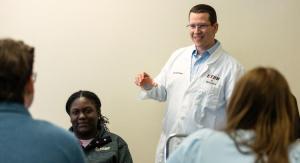The mission of East Texas Baptist University Teague School of Nursing is to prepare professional nurses as Christian servant leaders with the clinical reasoning and judgment skills to lead, serve, and provide Christ-centered, holistic care to individuals, families, communities, and populations.
- 2024 94.59% NCLEX-RN© Pass Rate
- 2024 100% Job Placement
- 2024 100% Acceptance Rate
- 2024 91.67% Retention Rate
The Teague School of Nursing offers a baccalaureate degree with a major in nursing. A strong liberal arts general education rich in natural and social sciences provides the foundational knowledge and critical thinking skills necessary for successful completion of the upper level nursing curriculum and as a beginning generalist in the field of professional nursing. The program prepares graduates to assume entry level nursing positions in nursing practice in a variety of healthcare settings within a culturally diverse environment and provides a foundation for advanced study in nursing. Graduates are eligible to apply to take the examination for licensure as registered nurses as set forth in the Texas Occupation Code and Statutes Regulating the Practice of Professional Nursing.
PROGRAM OUTCOMES
|
The profession of nursing requires practice and application of theoretical concepts. This is accomplished in learning laboratories on campus as well as in various community, primary, secondary, and tertiary health care facilities. Faculty and/or approved registered nurse preceptors employed in these agencies provide supervision. Students will be required to complete background checks and drug screens as required by various clinical agencies. The Teague School of Nursing does not guarantee that each person admitted to the nursing program will pass all elements of the program or that those graduated from the program with the BSN degree will pass nursing board examinations and/or secure employment as a nurse. Attaining these goals depends upon the degree to which students diligently apply themselves to their studies and upon the economic forces influencing the health care industry.
DEVELOPMENTAL STANDARDS FOR ADMISSION AND RETENTION
A candidate for the BSN degree must have the following abilities and skills: observation, communication, motor, and behavioral. Reasonable accommodations may be made for some disabilities; however, a candidate is expected to perform in an independent manner.
- Observation: A candidate must be able to observe a patient/client accurately. Examples of observation include, but are not limited to, listening to heart and breath sounds, visualizing the appearance of a surgical wound, detecting the presence of a foul odor, and palpating an abdomen.
- Communication: A candidate must be able to communicate/interact effectively with patients/clients and other members of the health care team to obtain information, describe patient situations, and perceive nonverbal communication.
- Motor: A candidate must have adequate motor function to work effectively with nursing problems and issues and carry out related nursing care. Examples of nursing care include, but are not limited to, ambulating and positioning clients, cardiopulmonary resuscitation; administration of intravenous, intramuscular, subcutaneous and oral medications; application of pressure to stop bleeding; opening an obstructed airway; and provision of client daily hygiene care.
- Behavioral: A candidate must possess the emotional health required for total utilization of his or her intellectual abilities. Candidates need to be able to tolerate physically taxing workloads and to function effectively during stressful situations. They must be capable of adapting to ever-changing environments, displaying flexibility, appropriately interacting with others, and learning to function in situations of uncertainty that are inherent in clinical situations involving clients.
STATE STANDARDS FOR ADMISSION AND RETENTION
The Texas Board of Nursing (BON) has identified certain circumstances that may render a potential candidate ineligible for licensure as a registered nurse in the State of Texas. These circumstances are found on the BON website (www.bon.state.tx.us) under the section entitled. Verification and Licensure / Candidates for Licensure / Declaratory Order.
Any student seeking admission to the nursing program will be required to complete the required criminal background check and initiate the Petition for Declaratory Order process if applicable. This process does require a fee payable to the BON if it is determined that a thorough investigation is necessary. Students who are deemed ineligible for licensure by the BON will not be granted admission to the nursing program.
The Texas Board of Nursing can be contacted at 512.305.7400. They are located at 1801 Congress Ave. Suite 10-200, Austin, TX 78701. The Commission on Collegiate Nursing Educated can be contacted at 202.887.6791. They are located at 655 K Street NW Suite 750, Washington DC 20001.
The baccalaureate degree program in nursing at East Texas Baptist University is accredited by the Commission on Collegiate Nursing Education.
Courses
General Education Requirements- 54 hours
English 1301, 1302, and three hours of sophomore literature- 9 hours
Fine Arts (three hours from fine arts, art, music, or theatre)- 3 hours
History (U.S. History)- 3 hours
Political Science 2305- 3 hours
Chemistry 1305 and 1105- 4 hours
Biological Sciences- BIOL 1421, 1422, and 2421- 12 hours
Social Science - PSYC 2301 and 2314- 6 hours
Mathematics 1329 or 1342- 3 hours
Christian Ministry 1301 and 1302- 6 hours
Physical Activity - KINE 1238- 2 hours
Natural Sciences – BIOL 1322- 3 hours
Communication 1311, 1315, or 1318 - 3 hours
Note: Appropriate course substitutions may be made for general education requirements with the permission of the Dean of the School of Nursing.
Nursing 3311 and 3350- 6 hours
Major area of study (see below)- 61 hours
Minor (optional, minimum of 18 hours if selected- 18 hours
Electives (to total 121 hours)
Total: Minimum one hundred twenty-one (121) semester hours












